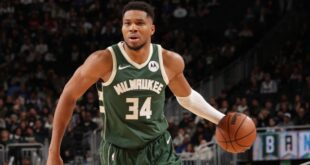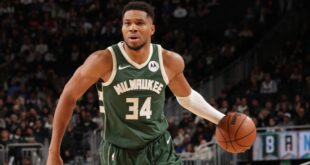OKLAHOMA CITY—The Timberwolves are gradually exhausting their options, strategies, and if this trend continues, they may find themselves losing games in the Western Conference Finals.
With the series now a best-of-seven standing at 2-0 in favor of the Thunder, it will take a significant change in performance from Minnesota at home to ensure that the next game played at Paycom Center isn’t the opening of the NBA Finals.
In consecutive matches, Oklahoma City showcased why they hold the No. 1 seed, firmly establishing their dominance with a commanding third quarter and relying on their robust defense, depth, and the newly crowned Kia MVP, Shai Gilgeous-Alexander, to assert control over the Wolves.
Except for brief moments of resurgence over the past two games, the Thunder have maintained a stronghold, suggesting that this series may lean heavily in their favor. Any potential for tension or a nail-biting finish will have to wait until Game 3 (Saturday at 8:30 p.m. ET on ABC), especially after OKC outscored their opponents by a total of 41 points in the first two games.
Though the Thunder faced some hurdles during the seven-game semifinals against the Nuggets, trailing at times, they have yet to encounter significant pressure in this matchup, as they inch closer to the Finals.
Here are five key takeaways from Oklahoma City’s 118-103 victory, with the upcoming games set to tip off at the Target Center in Minneapolis:
As he raised the Michael Jordan Trophy high before the game, his home crowd erupted in cheers. The celebration of both the MVP award and the jubilant crowd underscored the point: Gilgeous-Alexander reigns supreme in the basketball world.
The energy persisted through Game 2, just to underscore the Thunder’s dominance for any skeptics. Aside from a slow start in Game 1, where he struggled to score, Gilgeous-Alexander has thoroughly excelled in this series. Following a strong second half in the opener, he maintained his performance, leaving a mark at both offensive and defensive ends—hitting mid-range shots while also disrupting plays on the other side.
“He came prepared to play,” commented Thunder coach Mark Daigneault. “His approach, force, and versatility were evident. He made excellent passes, picked his moments wisely, and kept the scoreboard ticking in the clutch.”
His final tally of 38 points, along with eight assists and three steals, played a crucial role in the win and elevated him above Anthony Edwards in the series. Wasn’t this supposed to be a showdown between two burgeoning stars vying for the iconic face-of-the-league title? So far, it hasn’t unfolded that way—and may never.
No other team entered this year’s playoffs with the urgency of the Wolves. Driven by desperation and growth, they were the league’s hottest team when the postseason began, finishing the regular season with a record of 17-4 and advancing easily through the first two playoff rounds, winning eight out of ten.
Now, they’re facing genuine adversity.
After two consecutive losses, Minnesota is up against tougher competition than before. Gone are the easy wins of the regular season against teams like the Utah Jazz and the injury-riddled Golden State Warriors. The Thunder are not only formidable but also healthy and almost flaw-free. To have a shot, the Wolves need to elevate their games, something they have yet to do.
Their response, beginning in Game 3, will reveal much. Can Edwards maintain his aggression? Will Julius Randle bounce back? And what adjustments can coach Chris Finch implement in the next 48 hours?
The team’s most pressing need is a dynamic playmaker. Mike Conley appears to be wearing down at this point in his career, and none of the players off the bench have a pass-first mindset, leaving it to Edwards and a frequently turnover-prone Randle to orchestrate the offense. The Thunder’s top-rated defense is well aware of this.
Randle’s absence was felt not only throughout large portions of Game 2 but especially in the fourth quarter when he remained on the bench. Perhaps it was a predicted outcome, but seeing Randle struggle is unusual in the playoffs.
Actually, make that a game and a half. After a solid 20-point first-half performance in Game 1, he has faltered since, accumulating just 14 points over the last six quarters following a rough outing on Thursday marked by two field goals and four turnovers.
When asked about benching Randle in favor of Naz Reid in the fourth, did it reflect a lack of trust from Wolves coach Chris Finch?
“I thought Naz was playing well; I just wanted to spread the floor and see if we could make quick decisions,” Finch explained.
Randle’s struggles expose an even deeper issue for the Wolves: their offensive efficiency is mismatched against the Thunder’s defense.
Oklahoma City holds the upper hand whenever Minnesota has possession. Their defenders excel at seizing opportunities, aggressively attacking dribbles, executing swift rotations to handle double teams, poking at the ball, and shutting down passing lanes.
This is especially pronounced when the Wolves, apart from Edwards and Randle, are in search of scoring solutions. This team isn’t constructed for that kind of high-flying play, a hidden truth about their composition. The Wolves generally rely on a rugged style of play that hinges on defense, rebounding, and having Edwards perform at superstar levels. They rarely excel in high-scoring matchups.
It places immense pressure on players such as Reid, Donte DiVincenzo, and Jaden McDaniels to contribute, though none are prolific scorers. Their scoring hasn’t been dependable for the first two games of this series either.
Edwards netted 16 of his 32 points by halftime but sought help in the second half, finding limited assistance apart from some late scoring from McDaniels (22 points) and Nickeil Alexander-Walker (17). Edwards had to take control with more shot attempts (22) following a subdued 18-point performance in Game 1, where he managed only five points in the second half.
“Edwards was let loose,” noted Daigneault. “Our guys rose to that challenge. He truly had to earn everything.”
This frustration boiled over midway through the fourth quarter when McDaniels pushed Gilgeous-Alexander to the ground with the Thunder leading by 16 points.
“I just wanted to foul him,” McDaniels stated. “I wasn’t upset; I just had fouls to use.”
Oklahoma City restricted Minnesota to 41.4% shooting overall, including just 28.2% from beyond the arc, as they secured a 2-0 lead in the series.
Throughout the semifinals against the Nuggets, the Thunder’s struggles proved to be costly, stretching the series to seven games.
Since then, Williams has bounced back in a big way. Following an impressive Game 7 to eliminate Denver, he has continued to impress, contributing significantly on both ends in the back-to-back victories against Minnesota.
On Thursday, he delivered 26 points, 10 rebounds, five assists, and did not record a turnover. His energy was evident, providing the Thunder with precisely what they require—an effective secondary option alongside Gilgeous-Alexander, a role he filled successfully throughout the season.
“He was incredibly aggressive,” Daigneault said. “He chose the right moments to score, whether pulling up or attacking the rim, and distributed the ball intelligently. What a performance.”
Make that outstanding performances, plural. Over two games in this series, Williams has accumulated 45 points, 18 rebounds, and 10 assists while maintaining an astonishing lack of turnovers against Minnesota’s strong defense. Additionally, he has recorded six steals.
The Wolves have dilemmas to address, and he is certainly one of them.
* * *
Shaun Powell has been covering the NBA for over 25 years. For inquiries, you can reach him via email here, view his archive here, or follow him on X.
The opinions expressed in this article do not necessarily reflect those of the NBA, its teams, or Warner Bros. Discovery.
 NBA News NBA News, Match Reports and Updates
NBA News NBA News, Match Reports and Updates



